
Melinda Given Guttmann
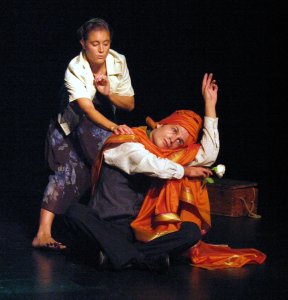 |
| SEEKERS -- Electa Behrens (USA) as Noor Khan and Janos Bus (Serbia) as Vilayat Khan. |
"Seekers"
October 7 and 8, 2005 (closed)
La MaMa E.T.C. (First Floor Theater), 74A East Fourth Street
Presented by La MaMa E.T.C.
Performed by DAH Theatre Research Centre, Jadranka Andjelic Project
Direction: Jadranka Andjelic
Performers: Electa Behrens(USA) Janos Bus (Serbia)
Reviewed by Melinda Given Guttmann October 8, 2005
"No One /In need of love/ Can Sit with my verse for an hour/
And then walk away without carrying golden tools./ and feeling that God
just came near."
- - Hafiz, "The Gift"
For those blessed with attending "Seekers", a luminous interdisciplinary organic masterpiece of performance art at LaMaMa E.T.C. October 7 and 8, the possibility of being subliminally transformed by transcendent love falling like rain around you; and hints of knowing the world as pure light and freedom make it a unique experience. It is a small sparkling jewel of an hour and ten minutes, a microcasm of beauty which flashes light with ordinary objects like flashlights on the cosmos.
It makes us humble, that the auteur-director Jadranka Angelic, who spent six months creating this sublime artwork, comes to us from the DAH Research Center in Belgrade, in the former Yugoslavia. A contemporary story traces fragments of the lives of a brother and sister, Noor and Villiat Kahn, who were raised by their father, a religious leader, in almost isolation from the world, in the contemplative Sufi tradition (which is the mystical branch of Islam). The brother and sister were were suddenly thrown into the chaotic violence of the Nazi terror of World War II, during which Noor heroically becomes the first woman radio spy in Paris, and who was interrogated, tortured and put in the ovens in Dachau. She died courageously because of her mystical belief that death is an illusion, and that god is in everything, and that everything is in God. Her brother, Vilayat, also a war hero, survived and became the international leader of the Sufis. He died just last year in 2004. Their story is narrated in fragments, in a neutral voice, by the brother and serves as the background of the piece. The actors neither inhabit the characters, nor present themselves as in ordinary life, but attempt to present the selfless flowing of enlightened beings.
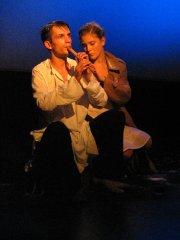 |
"Seekers" represents not only all spiritual seekers on a path to God, but specifically the Sufi seeker, who does not need a intermediary priest, teacher, or guru to guide him. This mystic branch takes the direct path to union with God, which is a circle. It is a circle because the Sufis do not see humans as inferior to God; but as God, seeking God: a circle divided by a veil. This veil is symbolized in the production by a scrim which is variously lit up and both exposes and hides paradise.
The primary texts of the piece are the God-intoxicated poetry of Hafiz, a fourteenth-century medieval Persian poet. He lived during a chaotic period of time parallel to ours, which was dominated by Islamic fundamentalism. The fundamentalists persecuted him in the belief that his mystic work and teachings were heretical. He was dismissed as a college professor and sent into exile and poverty. At the end of his life, he returned to his birthplace in Shiraz where he was honored and celebrated. Today, in Iran, in modern Persia, as many people who own the Koran, own Hafiz's poetry. (In America, the most famous Sufi poet is Rumi, who founded the order of the whirling dervishes, another path to God consciousness in a circular form.) The performance piece, reflecting its origin, is structured in a circular and nonlinear manner which reifies Sufi teachings.
Although the company is international, its roots in the former Yugoslavia remind us that we witnessed in shameful inaction the recent events of the barbaric murder, torture, and rape of Serbian Muslims by their Christian countrymen. This reminds us also of the primacy of the power of artistic truth to bring peace to the world. An American public intellectual, Susan Sontag, risked her life by going to the former Yugoslavia and mounting a production of Beckett's "Waiting for Godot" to protest the atrocities against the Muslims.
"Seekers" serves the same purpose in protesting the inner and out terror of hatred which has overtaken the planet; and the brutality of Islamic, Christian and Jewish fundamentalism. It is also shameful that most Americans have been brainwashed into accepting the necessity of a planetary war against Islamic terrorism based on the utter ignorance of the beauty of the Muslim religion and the Koran which brought forth the Sufi tradition. After 9/11, I attended a meeting at the Zen Peace Community. A beautful, tall, blond, American who was the Sheikah of the same Sufi tradition as "Seekers" stated that "Sufi is Islam" and "Open your hearts with Love." "Seekers" states, from Hafiz, that "nothing in the world is real but light." Therefore we have imprisoned ourselves in illusion, in the Blakean mind-forged manacles which make evil and death seem real, when in absolute terms "all is God, and everywhere."
Normally, the stories and wisdom of the world's spiritual seekers are plotted on a linear allegorical path, like Medieval passion plays or Strindberg's "To Damascus." They express the longing for enlightenment as the secret gnosis of a few sacred beings, whose truths remain ineffable in human language, unobtainable by the sinfulness of most humans. Sufis believe that since we are already God we are by nature without sin. Sufi poets coded their concepts in the concrete and sensuous terms of the "Beloved" or the "Friend" for God, "the "Tavern" for the Mosque, "Wine" for the ecstasy of God and a "Rose Garden" for Paradise on Earth. "Seekers" quotes Hafiz, eliminating the word God, so it approaches the subject subtly and obliquely. It uses the less sensuous poems for which the Sufi poets were persecuted, purists mistaking ecstatic love for erotic love.
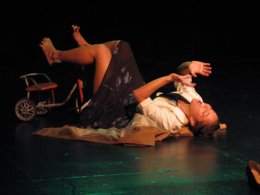 |
A
child's tricycle becomes an iron tank. |
Sufis, as exemplified in "Seekers," do not feel that anyone is better or worse than another, that enlightenment is open to all; and they do not idealize Prophets, saints, or avatars like Jesus, Mohammed, or Buddha as rare; but see all of us as equal manifestations of God. They view our journey as a circular one of God seeking God.
On the surface, the story is combined and intertwined with precise, intricate, abstract dance movement, with the constant magical transformation of ordinary objects, like children's toys: a silk sari becomes an Indian turban, then a rive; a child's tricycle becomes an iron tank. The circular drawings on the floor represent both ashes of the dead and the eternal life of the cosmos. There is music (she beats on a small drum, he plays the flute), song, chanting, color. Vibrant red lights appear behind the scrim angled over their heads; conversational voice becomes chanting; there is wild and unexpected lighting; there are transformations of the self as areas multiply, refracted. The lineage of their technique is the theatrical method created by the great polish avant-garde artist Growtowski's post-modern Poor Theatre in defiance of the Iron Curtain.
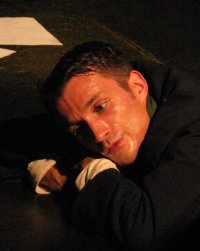 |
| Janos Bus as Vilayat |
This post-post modern piece succeeds in incarnating the power of spirtual resistence to the present planetary hurtling into a dark age of Medieval gothic torture, murder, obscene violence against women and children, racial and religious massacres: all the insane deaths of millions propelled by the ignorance of hatred. Vilayat's first speech at the end of the performance begins with the title of one of Hafiz's most famous poems, "Tonight the Subject is Love." And each night of this performance the subject is love.
The Sufi teachings guide us to transform ourselves through love; and that through self-liberation we can transform the world and experience paradise on earth, as it is said in Hebrew mysticism, yud zain lamed, heaven on earth, which is our birthright.
"Seekers" was shocking to me personally. I have myself for many months composing a performance piece in which the primary texts are Hafiz's poetry, combined with my own story of mystical experiences, in which I experienced with clairty of vision that we are all Love, God, Interconnected and One; and the Medieval story of a saint who became enlightened with both a Sufi and Hindu teach in Kashmir. I do not believe in karma, so this coincidence was intensified because in 2002, I not only meditated in silence with the Women in Black from the former Yugoslavia in front of the New York Public Library, but took them to bear witness to a conference on women and poverty at Sarah Lawrence College. In spite of being middle-aged, I performed a dance reifying their images of suffering to the voice of a Croation Opera star, then meditated on Love with the audience from the self to the cosmos. Many students came up to me and asked me if I was channeling. I said no, I was merely holding up the mirror of their own infinite capacity to love.
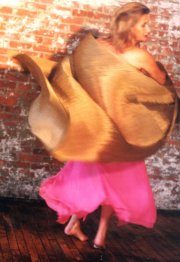 |
| a recent photo of the reviewer dancing |
The Artists of "Seekers" were holding up the mirror of their Love to the audience; and I hope that even the atheist reviewer from Serbia sitting next to me was even minutely altered by the experience.
I rarely include my private experiences in theatre reviews, but "Seekers" so overwhelming shared my own vision, that whoever reads this should know that I am writing from a unique identification with the work. To top it off, the charismatic American actress playing Noor is a recent graduate of Vassar College, my own beloved alma mater. The universe does move in mysterious ways!
Needless to say, I hope "Seekers" travels around the world as a beacon light of hope for transformation.
Hazrat Inayat Khan wrote of the Sufi mysticism of music, dance, and song, "Music is the minature of the whole harmony of the universe...where does music and dance come from? ...when the spiritual life springs forth..."
I end with a quote from Hafiz's "Laughter": "What is laughter?. . .it is the sun poking its sweet heat out from behind a cloud/you have been carrying too long, veiling your eyes and heart./It ia Light breaking ground for a great Structure /that is your Real Body–called Truth. . . . Know that to God's eye all movement is a wondrous language/ your magic movement Dancing/..such equisite wild music./What is laughter, Hafiz?/ It is the glorious sound of a soul waking up!" [Guttmann]
NYTW readers may email Melinda Guttmann at: starnyc@aol.com
| museums | NYTW mail | recordings | coupons | publications | classified |